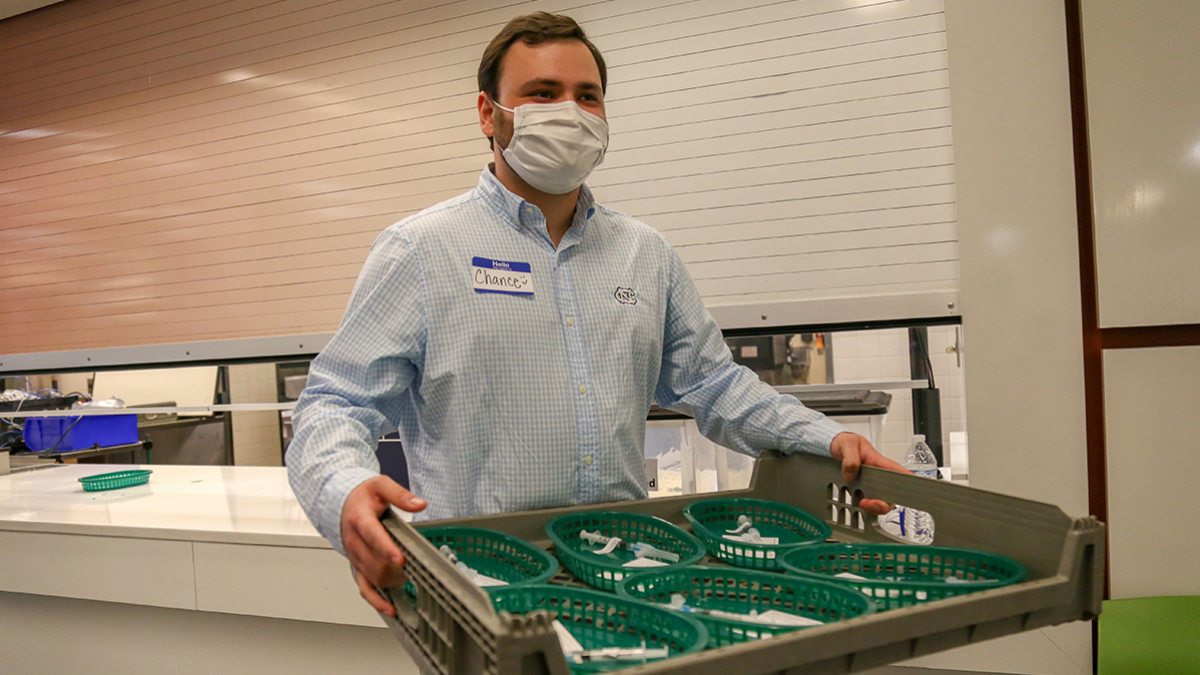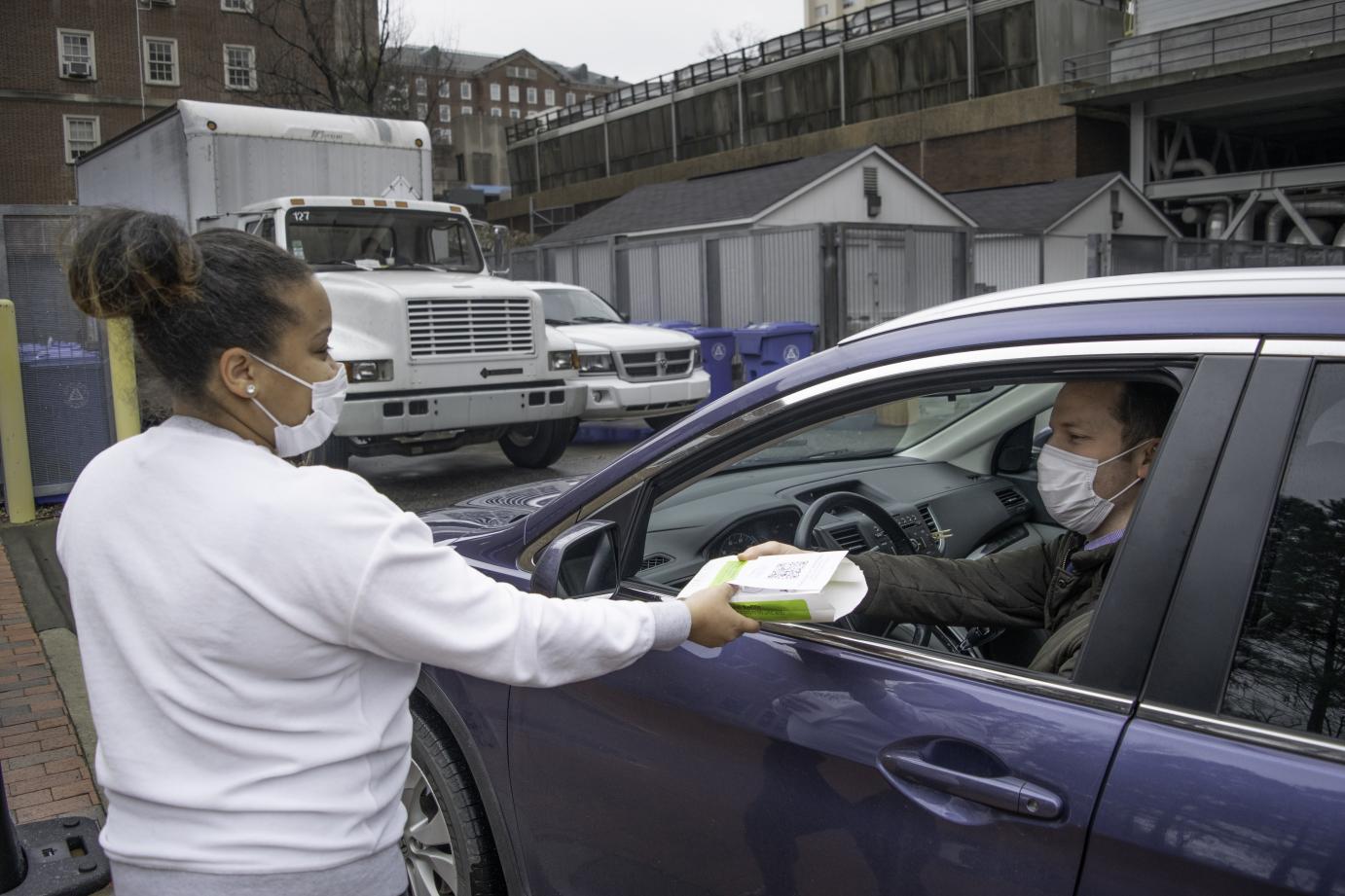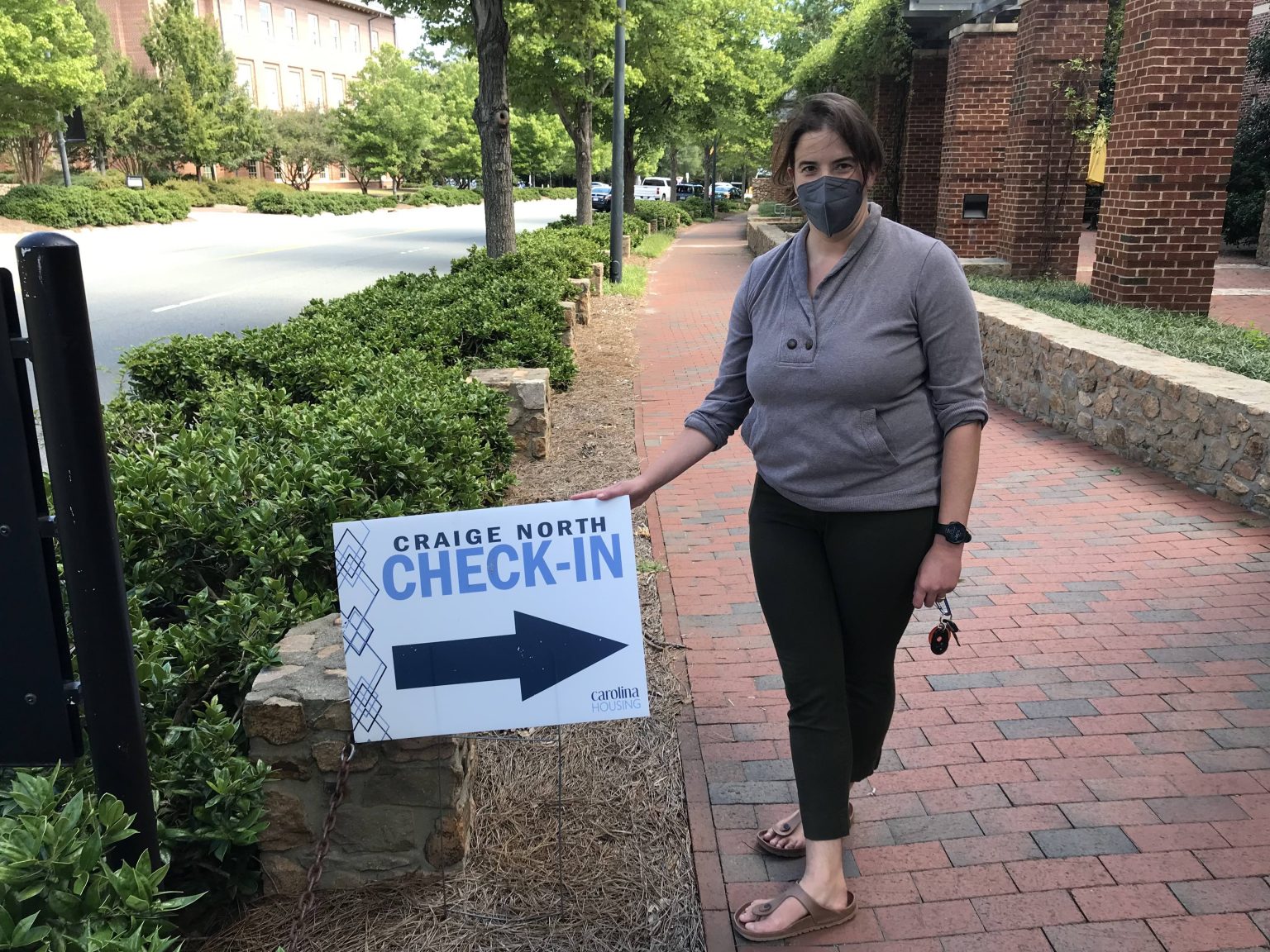What’s working? In a word, collaboration
Six weeks into the fall semester, the COVID-19 metrics are tracking as expected and show, without a doubt, that the Carolina community is taking care of each other.

The numbers are promising.
Between Sept. 13 and Sept. 19, the Carolina Together Testing Program processed 4,710 asymptomatic tests for COVID-19, and only 16 came back positive. The asymptomatic positivity rate is 0.34%, down from 1.13% in the previous week. The symptomatic testing rate for the same period is 2.1%, down from 6.8% the week before.
According to Campus Health, most of the symptomatic positive student cases identified in the community have experienced relatively mild, cold-like symptoms. Campus Health has not received any reports of student hospitalizations due to COVID-19 this semester.
No one is suggesting this is mission accomplished, but it’s not too soon to celebrate the success so far — and double down on what’s working.
What is working? In a word, collaboration.
The metrics are tracking as expected and show, without a doubt, that the Carolina community is taking care of each other.
Six weeks into the fall semester, 93% of students have attested that they are vaccinated, as well as 93% of faculty and 83% of staff. And those numbers continue to climb. Last week, the Student Stores Pharmacy gave 150 COVID-19 vaccinations.
Everyone is wearing masks indoors.
The collaboration to keep Carolina safe from COVID-19 involves too many people to recognize in a single story, but here we shine a light on some of the extraordinary efforts happening across campus. Want to give a shout-out to a team working hard to keep campus safe from COVID-19? Email us at thewell@unc.edu.
Carolina Together Testing Program
The launch of the Carolina Together Testing Program in January 2021 was a turning point for Carolina in the fight against COVID-19.
Since then, the cross-campus team running the program has been hard at it, processing more than 215,000 tests so far. “We’ve gained a lot of efficiencies,” Barzin says. “We have optimized the use of the HallPass app. We’ve streamlined the process for students and employees to make it easier.” During the early days of testing, for example, students and employees had to write their personal identification number and date of birth on a sticker and apply that to the sample test tube. Now, it’s all done electronically. Users scan a barcode, and the sticker gets printed.

Olivia Council demonstrates the PCR testing machine at the UNC-Chapel Hill COVID Surveillance Laboratory. Samples are brought to this lab where they are run through a Polymerase Chain Reaction (PCR) testing process to determine if the sample is positive or negative for COVID-19. (Jon Gardiner/UNC-Chapel Hill)
The testing team has worked hard to manage staffing. Over the summer, the campus population dropped and so did COVID-19 cases. Testing slowed considerably, but this fall, with the rise of the delta variant and the return to in-person instruction, testing demand skyrocketed. Barzin’s team ramped up to more than two dozen employees; around one-third of those run the testing center and the rest processing samples at the custom-built UNC COVID Surveillance Laboratory.
“That doesn’t include the Carolina COVID-19 Student Services Corps,” Barzin says. “And it doesn’t include the IT team that is constantly working to make sure everything we are doing is up to par.”
The Carolina COVID-19 Student Services Corps’ 1,500 volunteers, managed by Meg Zomorodi, UNC School of Nursing assistant provost and director of the Office of Interprofessional Education and Practice, have served 27,000 hours.
Barzin is quick to mention Amy Loftis, who manages the COVID Surveillance Lab. “She deserves so much credit,” he says. “She is overseeing a process that is ridiculously difficult, and she has been doing that since day one, troubleshooting to make sure samples are collected and processed quickly and correctly. She is the most selfless person I’ve ever met. She does this because 1) she thinks it’s the right thing to do, and 2) she really loves and cares for this community.”
Barzin is cautiously optimistic. “I can’t help but be hopeful with how things have gone so far,” Barzin says. “You have to accept things with grace. Tomorrow is a new day.”
Campus Health
Director of Campus Health Ken Pittman says he is extremely proud of how his team has risen to meet the challenges posed by the pandemic.
In the last 18 months, Campus Health has contact-traced nearly 10,000 students and given almost 5,000 COVID-19 vaccine doses. That’s on top of the average 110,000 regular care visits and 70,000 prescriptions Campus Health provides each year.

Campus Health Pharmacy staff fill on average 70,000 prescriptions each year, and for the last 18 months they have delivered prescriptions or over-the-counter items to lessen indoor contact. (Image courtesy of Campus Health)
“What we thought would be a sprint in March of 2020 has turned into an almost two-year marathon, which we would never have been able to run without the medical professionals at Campus Health, Carolina’s infectious disease experts and the campus community members who follow the COVID-19 Community Standards,” says Pittman.
Campus Health employees were one of the few groups who never went remote during the pandemic and still saw students face-to-face before a vaccine was available. To them, the high vaccination rate has marked this semester as a turning point in the fight against the virus.
Amy Sauls, director of pharmacy and professional services at Campus Health, says that very few students (only 2.2% each week) are testing positive every week this semester, while vaccine rates continue to climb.
“We’re still seeing sick students for in-person visits, video counseling students and doing contactless prescription fills,” says Sauls. “Our work never stopped, but now that there’s a vaccine, we can do our jobs with the confidence that 93% of the students we’re interacting with are vaccinated.”
To continue to make this semester successful, Sauls and Pittman emphasize three steps Carolina faculty, staff and students can take:
- If Campus Health, the University Employee Occupational Health Clinic or the Orange County Department of Health calls you for contact tracing, pick up the phone and be perfectly honest. If you’re called, that means you either tested positive or were exposed to someone who tested positive for COVID-19 for more than 15 minutes consecutively.
- If you haven’t had a dose of a COVID-19 vaccine yet, there’s no time like the present because the Carolina Vaccination Clinic is still offering free doses of all three vaccines for students, faculty and staff.
- In addition, getting a flu vaccination this fall is imperative to prevent the spread of another contagious respiratory illness. The two vaccines don’t interact, so you can get both a COVID-19 and flu vaccine in close proximity with no interaction.
Pittman has one last, non-medical directive to improve the fall semester: Be kind to each other.
“I’d like to emphasize a return to grace, empathy and optimism this semester,” Pittman says. “We’re trying to emulate that at Campus Health, because despite the rise of the delta variant, we’re still achieving great things on campus by working together as a community.”
Carolina Housing
When students test positive for COVID-19 or come into close contact with someone who has tested positive, Carolina Housing steps in to oversee isolation and quarantine housing.
Thanks to a 93% student vaccination rate — and nearly two years of experience providing temporary housing to over 720 students — the quarantine and isolation housing process is a well-oiled machine that helps meet the needs of residential students 24/7 year-round.

Staff members call students in quarantine and isolation every day to check in and see how they’re doing. They have conducted over 4,200 calls since last September, says Ashley Gray, above. (Photo by Mariam Azzam)
Carolina Housing staff works hard to meet students’ basic needs and keep them physically safe while also taking their mental and emotional needs into account.
When students receive notice of a positive COVID-19 test, Carolina Housing contacts them; they are taken via Point-to-Point transportation to their temporary room assignment. The primary quarantine building is Horton Residence Hall, and the primary isolation building is Craige North Residence Hall. There is a contactless check-in process when students arrive. They order their meals online and Carolina Dining Services delivers them to their door.
Living alone for 10 to 14 days is never ideal.
But Carolina Housing staff works tirelessly to make the process as painless as possible for students.
Staff members call students every day to check in and see how they’re doing. They have conducted over 4,200 calls since last September, says Ashley Gray, managing director of on-campus isolation and quarantine.
The purpose of the calls is to make sure residents are as well as can be expected in a challenging situation. Often they end up talking about hobbies and other strategies to stay well while in isolation. Gray even provides journal prompts for students to reflect on.
“To be alone and not lonely is a really difficult thing, especially if you think about being a first-year student coming to campus and then ending up in isolation on day three of being here,” Gray says. Gray has talked to students almost every day, and she still keeps in touch with a few students that ended up in isolation last year.
Some days, as many as 100 students in quarantine and isolation received phone calls on a daily basis.
“Calling 100 people in a day is no easy task,” Allan Blattner, executive director of Carolina Housing, says. “Some of the calls are short and to the point, while others require support from Campus Health, the Dean of Students Office or other campus resources.
It meant training many staff in the housing department, even some employees who would normally work behind the scenes, to make daily phone calls.
Housing also partners with Carolina Dining Services and Aramark to provide a variety of meal options to students in quarantine and isolation, including vegetarian, vegan and gluten-free choices. Carolina Dining has delivered over 13,000 meals to students since the start of the pandemic.
Additionally, the quarantine and isolation process — along with normal Carolina Housing operations — would not be able to run without the hard work of housekeepers, facilities staff, community directors and resident advisers.
“It really has been a total lift from our department, and I am incredibly proud of our work,” Blattner says.




